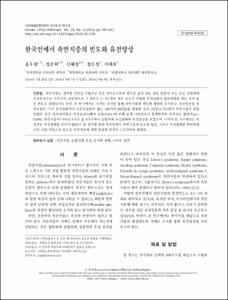한국인에서 측만지증의 빈도와 유전양상
- Keimyung Author(s)
- Lee, Jae Ho
- Department
- Dept. of Anatomy (해부학)
- Journal Title
- 대한체질인류학회지
- Issued Date
- 2016
- Volume
- 29
- Issue
- 3
- Abstract
- Clinodactyly, as rare congenital malformation, refers to a curvature of a digit in a radial or ulnar
direction in the coronal plane. The abnormality is inherited as an autosomal dominant trait. And its frequency
was low, however, it was higher by accompanying other congenital anomaly. In present study, the frequency and
genetic characteristics of clinodactyly were investigated. In 100 family (382 peoples), clinodactyly was found in
4.7% (n=18). All clinodactyly were bilateral and it was more frequent in female (6.8%) than male (2.6%), without
statistical difference (p=0.056). Its inheritance was autosomal dominant trait in 80% (4/5) families, however, one
family did not have any inheritance pattern. We described the frequency and clinical implication of clinodactyly,
and this description will be lead to an improved understanding of its spectrum and inheritance.
측만지증는 경미한 선천성 기형으로 주로 새끼손가락이 옆으로 굽게 되는 것을 말한다. 이는 주로 상염색체
우성유전으로 나타나며, 일반적으로 그 빈도는 2~5%대로 매우 낮으나 다양한 유전질환이 동반되었을 때는 보다 높
은 빈도로 관찰되기도 한다. 본 연구에서는 가계도 조사를 통해 측만지증의 빈도와 형태를 조사하고, 유전양상을 알
아보았다. 기저 유전질환이나 선천성질환이 없는 100가구 (382명)를 관찰한 결과, 18명 (4.7%)에서 측만지증이 관찰
되었다. 모두 양측성이었고 여성 (6.8%)에서 남성 (2.6%)에 비해 높게 나타났으나 통계학적인 유의성은 없었다 (p=
0.056). 측만지증이 나타난 5가구 중 4가구에서 상염색체 우성형태의 유전양상을 보였으며, 나머지 한 가구에서는 특
징적인 유전형태를 보이지 않았다. 본 연구를 통해 한국인에서 측만지증의 빈도와 양상, 그리고 유전형태를 확인하였
으며, 이를 바탕으로 앞으로 측만지증에 대한 관심과 인식이 고조되어야 하겠다.
- Alternative Title
- The Prevalence and Genetic Pattern of Clinodactyly in Korean Populations
- Keimyung Author(s)(Kor)
- 이재호
- Publisher
- School of Medicine
- Citation
- 송두현 et al. (2016). 한국인에서 측만지증의 빈도와 유전양상. 대한체질인류학회지, 29(3), 99–103. doi: 10.11637/kjpa.2016.29.3.99
- Type
- Article
- ISSN
- 2287-626X
- Appears in Collections:
- 1. School of Medicine (의과대학) > Dept. of Anatomy (해부학)
- 파일 목록
-
-
Download
 oak-2017-0492.pdf
기타 데이터 / 442.95 kB / Adobe PDF
oak-2017-0492.pdf
기타 데이터 / 442.95 kB / Adobe PDF
-
Items in Repository are protected by copyright, with all rights reserved, unless otherwise indicated.